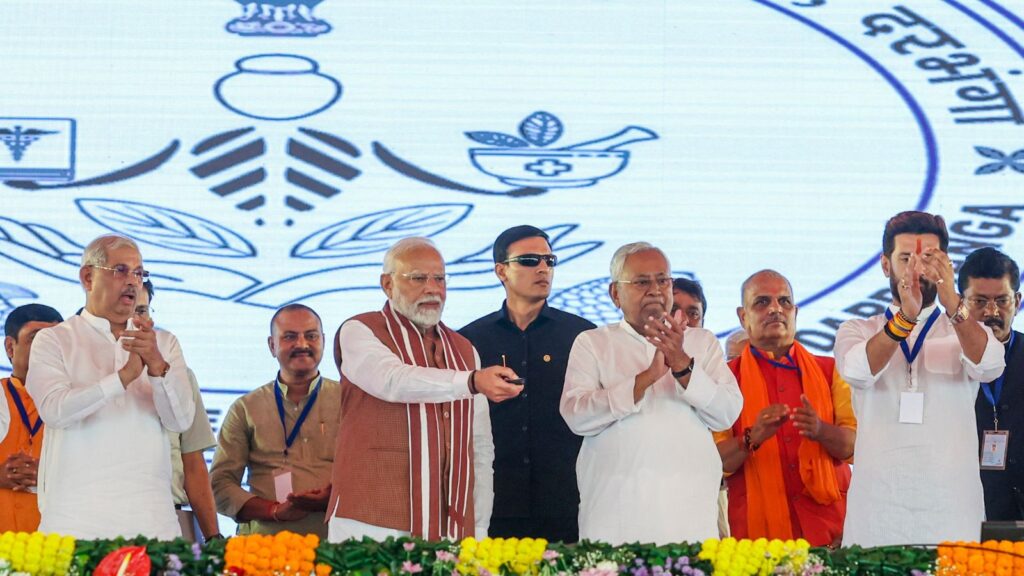New DelhiAugust 24, 2025 03:30 PM IST
First published on: Aug 24, 2025 at 03:30 PM IST
With the Assembly elections in Bihar just a couple of months away, the National Democratic Alliance (NDA) is in the final stages of seat-sharing negotiations, with sources indicating a near consensus between the BJP and the Janata Dal (United).
According to sources, the two key allies are likely to contest an equal number of seats, between 100 and 105 each, out of the 243 total constituencies. The Chirag Paswan-led Lok Janshakti Party (Ram Vilas), or LJP (RV), which has been demanding 40 seats, is likely to be offered about half that number. The remaining seats are expected to go to Jitan Ram Manjhi’s Hindustan Awam Morcha (Secular) and Upendra Kushwaha’s Rashtriya Lok Morcha (RLM).
However, the equations could change if Mukesh Sahani’s Vikassheel Insaan Party (VIP), currently aligned with the RJD-Congress Mahagathbandhan, switches sides.
JD(U)’s parity push, LJP factor
In the 2020 Assembly elections, the JD(U), led by Chief Minister Nitish Kumar, contested 115 seats and the BJP 110. At the time, the VIP, then part of the NDA, contested 11 seats and the HAM (S) seven constituencies, while the LJP contested 135 seats on its own. The BJP emerged as the stronger partner, winning 74 seats compared to the JD(U)’s 43. But despite this, sources said the JD(U) was unlikely to accept fewer than 100 seats this time.
“The JD(U)’s poor performance last time was largely due to the LJP fielding candidates against it. The party still commands around 10% of Bihar’s votes, especially among the Extremely Backward Classes (EBCs), and its role remains crucial. The polls are being fought under Nitish Kumar’s leadership, with the campaign centred on bringing him back as chief minister. There’s no question of the JD(U) contesting fewer seats than the BJP, though minor adjustments may be made to accommodate allies,” said a senior NDA leader.
Seat-sharing negotiations have largely settled between the BJP and JDU, with the LJP (RV) being the main point of contention. “They’ve been demanding 40 seats, which is way above their weight,” said a senior BJP leader. “Yes, they have five MPs and that will be respected, but the realistic figure is closer to 20. We also need to accommodate Kushwaha and Manjhi and there could be a few surprise entrants.”
The LJP (RV)’s argument stems from its strong performance in the 2024 Lok Sabha polls, in which it won all five seats it contested and secured over 6% of the vote share, leading in 29 of the 30 Assembly segments in its constituencies.
A senior JD(U) leader, however, downplayed this, saying, “The Lok Sabha elections were fought under Narendra Modi’s leadership. For the Assembly polls, local factors and a party’s grassroots strength matter far more.”
In the 2020 Assembly polls, the LJP, a year before its split, managed to win just one seat, Matihani, despite contesting 135 seats. However, its decision to field candidates against the JD(U) cost the NDA dearly. In 64 seats where the party finished third or lower, it polled more votes than the victor’s margin. Of these, it directly hurt the JD(U) in 27 seats where it finished second.
Sources said the LJP (RV)’s recent criticism of the Nitish Kumar government’s law-and-order record and Paswan’s assertions about returning to state politics were aimed at pressuring the alliance for a larger share of seats. LJP (RV) leaders, however, insist this is part of the party’s broader expansion strategy, with an eye on securing at least 15% of Bihar’s votes in the long term. Despite contesting widely in 2020, the party managed just 5.66% of the vote share.




